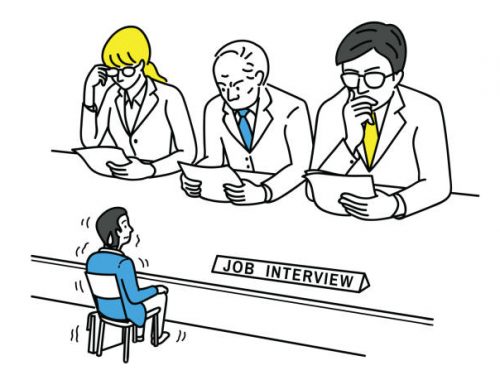
The interview may have been simulated, but the anxiety was real!
To me, interviews have always been a daunting experience. No matter how much I have prepared, somehow the moment I sit in front of a panel of professionals my anxiety will always get the best of me. You can imagine then how I felt about having to be interviewed by my peers, then having to inflict the same fears onto them when it was my turn to act as the interviewer.
You would think being interviewed by my peers would ease my anxiety, but somehow it made it worse. Projecting the best version of myself to people I knew felt arrogant, yet if I didn’t sell myself, I would be denying myself beneficial practice this opportunity allowed for future interviews. The job I applied for was for a producer of a television show in the BBC – a company I have longed to work for years now so this process seemed ever more intimidating to me.
Luckily through the AEL3001 module, I was directed to some very useful tricks for putting my mind at ease by offering solutions to common interview mistakes so I could put my best self forward. Therefore, this blog post follows Boud’s reflective model (34) to dissect the experience so I may learn how to better myself for real-life interviews.

“Reflection is an important human activity”
(Boud,33)
.
As the adage goes – fail to prepare, prepare to fail!
Being self-aware of my anxiety, on top of the advice from my career’s advisor Emma Lenox, meant that the preparation process was crucial for calming my nerves. Providing structure to potential questions allowed me to present my answers in a much more fluid and engaging manner. I particularly found the past-present-future guideline for answering the unnerving “Tell me About Yourself” question, but I mainly utilised the STAR technique when drafting sample answers.

I kept the description of each task brief as “Time is precious in TV” (Sharp, 100), going into more detail on the action section on the evidence-based questions (e.g. a time you were under pressure). However, through evaluation of my preparation, it is clear I did not use this technique correctly as the sample answers did not reflect how I spoke but how I wrote. In the future I would limit my answers to key talking points such as company values as well as reflecting on past experiences and knowledge learnt from my course, speak in an informative and structured manner, and not worry about saying exactly what I have prepared.
,
How’d it go?
As I was interviewing my peers, I noticed what I was looking for, which calmed my nerves as I paid particular attention to this. My turn was last and I felt fine until I had to leave the room to look at my notes. I didn’t think I retained any of my notes and started to panic so when I sat in the hot seat in front of the interview panel, I was very visibly nervous.

Knowing that “33% of hiring managers claim to know whether or not they would hire a candidate within 30 seconds of meeting them.”(jobdescription-library.com Job interview statistics) I did what I could to limit the fallout.
,
I tried to sit up straight and not fidget whilst answering questions about why I would want to work for the BBC, dazzling them by relaying their company values such as “To reflect the United Kingdom, its culture and values to the world” (bbc.co.uk Mission, Values and Public Purpose).
However, as I learned from my peers’ feedback that by focusing on not looking nervous, it made my body language stiff making me look unapproachable. The irony was not lost on me and would lead to a less robotic and systematic approach in the future
“The questions that were asked were all answered very well and gave good examples of skills and passion. Natasha related her experiences back into the job role. An improver would be general confidence and being calm and cool in the interview scenario!”
(An example of peer feedback)
.
Practice makes perfect!
As I have learned from my placement this year, confidence improves with practice. For example, I was too scared to attempt any dynamic shots when I started placement, but now I get excited anytime I get to do a slow pan or pull focus. Repeated actions make for more experience, and as everyone knows the more experience you have the better. Upon reflection, I learned that the reason I was so nervous was due to feeling inadequate as I have not had many experiences as a producer, despite wanting to pursue this pathway later in life. I will put myself forward for more producer roles for my placement to better my confidence in this area whilst believing that I am qualified and worthy of the jobs I apply for. Furthermore, I will relax more as the worrying about being worried is not benefitting me at all and understanding that whatever is meant for me will be – as long as I have accurately prepared of course! Next time I am in an interview environment I will:
- structure my notes down to key talking points to allow for fluid oral communication
- not overthink my answers by knowing that I don’t have to hit every point prepared previously but have a concise checklist of two or three areas I wish to discuss
- practice more interviews by putting myself out there more and applying for jobs in this sector.
Overall, by reflecting on this experience I have learnt a great deal about how to combat my anxiety and have realised that I don’t have to be perfect to be the best candidate, but be willing to practice, develop and learn as I go. Afterall, as Kellison states: “The producer in television and video has little choice but to be a lifelong learner, constantly researching, asking questions, and listening” (xiii).
References
- Boud, David, Rosemary Keogh, and David Walker. “Promoting reflection in learning: A model.” Boundaries of adult learning 1 (1996): 32-56.
- Job Interview Statistics 2021 | UK & Global. jobdescription-library.com/job-interview-statistics.
- Kellison, Cathrine. Producing for TV and video: a real-world approach. Routledge, 2012.
- “Mission, Values and Public Purposes – about the BBC.” BBC News, BBC, https://www.bbc.com/aboutthebbc/governance/mission.
- Sharp, Elsa. How to Get a Job in Television: Build your career from runner to series producer. Bloomsbury Publishing, 2014.
2nd Blog Post
You May Also Like

Simulated Interrogation
18 February 2022
9 February 2022

